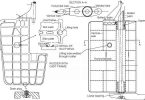For a passenger ship:
- Ship in the fully loaded departure condition with full stores and fuel and with the full number of passengers with their luggage;
- Ship in the fully loaded arrival condition, with full number of passengers and their luggage but with only 10% stores and fuel remaining;
- Ship without cargo, but with full stores and fuel and the full number of passengers and their luggage;
- Ship in the same condition as at paragraph 3 above with only 10% stores and fuel remaining
For a cargo ship:
- Ship in the fully loaded departure condition, with cargo homogeneously distributed throughout all cargo spaces and with full stores and fuel;
- Ship in the fully loaded arrival condition with cargo homogeneously distributed throughout all cargo spaces and with 10% stores and fuel remaining;
- Ship in ballast in the departure condition, without cargo but with full stores and fuel;
- Ship in ballast in the arrival condition, without cargo and with 10% stores and fuel remain
For a cargo ship intended to carry deck cargoes:
- Ship in the fully loaded departure condition with cargo homogeneously distributed in the holds and with cargo specified in extension and mass on deck, with full stores and fuel;
- Ship in the fully loaded arrival condition with cargo homogeneously distributed in holds and with a cargo specified in extension and mass on deck, with 10% stores and fuel.
Note:
- In the conditions mentioned in above paragraph , it should be assumed that the ship is loaded to its subdivision load line or summer load line or if intended to carry a timber deck cargo, to the summer timber load line with water ballast tanks empty.
- If in any loading condition water ballast is necessary, additional diagrams should be calculated taking into account the water Its quantity and disposition should be stated.
- In all cases, the cargo in holds is assumed to be fully homogenous unless this condition is inconsistent with the practical service of the ship.
- In all cases, when deck cargo is carried, a realistic stowage mass should be assumed and stated, including the height of the cargo.
- A mass of 75 kg should be assumed for each passenger except that this value may be reduced to not less than 60 kg where this can be justified. In addition, the mass and distribution of the luggage should be determined by the Administration.
- The height of the centre of gravity for passengers should be assumed equal to:
- 0 m above deck level for passengers standing upright. Account may be taken, if necessary, of camber and sheer of deck;
- 30 m above the seat in respect of seated passengers.
- Passengers and luggage should be considered to be in the spaces normally at their disposal, when assessing compliance with the criteria given above.





